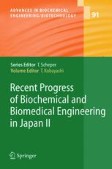Search
Search Results
-
Recent Progress in Microbial Cultivation Techniques
Recent advances in the improvement of microbial cultivation are reviewed, with emphasis on biochemical engineering techniques as a means of obtaining...
-
High Rate Production of Hydrogen/Methane from Various Substrates and Wastes
To treat soluble and solid wastes and recover energy from them, high rate methane fermentation, especially using the UASB (upflow anaerobic sludge...
-
Advanced Targeting Strategies for Murine Retroviral and Adeno-associated Viral Vectors
Targeted gene delivery involves broadening viral tropism to infect previously nonpermissive cells, replacing viral tropism to infect a target cell...
-
Nonviral Delivery of Cancer Genetic Vaccines
The potential use of genetic vaccines to address numerous diseases including cancer is promising, but currently unrealized. Here, we review...
-
Production and Formulation of Adenovirus Vectors
Adenovirus vectors have attracted considerable interest over the past decade, with ongoing clinical development programs for applications ranging...
-
Molecular Conjugates
Molecular conjugates are nanometer-sized entities consisting of synthetic materials (lipids, polycations, targeting agents, and so on) and nucleic...
-
Fluorescence Correlation Spectroscopy with Autofluorescent Proteins
Fluorescence correlation spectroscopy (FCS) is a versatile technique operating at the single-molecule level, that successfully meets many challenges...
-
Fish and Shellfish Upgrading, Traceability
Recognition of the limited biological resources and the increasing environmental pollution has emphasised the need for better utilisation of...
-
Stress Induced by Recombinant Protein Production in Escherichia coli
Strong production of recombinant proteins interferes with cellular processes in many ways. Drainage of precursors and energy urges the cell to...
-
Roles of Heat-Shock Chaperones in the Production of Recombinant Proteins in Escherichia coli
Escherichia coli is a versatile organism for the production of recombinant proteins. Often, however, the recombinant protein does not reach its...
-
Clarification of Interactions among Microorganisms and Development of Co-culture System for Production of Useful Substances
Co-culture systems containing two microorganisms for the production of useful substances are described. We developed a novel co-culture system...
-
Bacterial Capsular Polysaccharide and Sugar Transferases
Capsular polysaccharides (CPs) of several pathogenic bacteria are thought to be good materials for the development of new therapeutic reagents. These...
-
Bacterial Sterilization and Intracellular Protein Release by a Pulsed Electric Field
Several biotechnological applications of high-voltage pulsed electric field (PEF) are introduced. Electrical breakdown or disruption of a biological...
-
Facts and Theories of Induced Organ Regeneration
Induced organ regeneration is de novo synthesis of a physiological, or nearly physiological, organ at the same anatomical site as the organ that is...
-
Fatty Acids from Lipids of Marine Organisms: Molecular Biodiversity, Roles as Biomarkers, Biologically Active Compounds, and Economical Aspects
Because of their characteristic living environments, marine organisms produce a variety of lipids. Fatty acids constitute the essential part of...
-
Marine Microalgae
Marine microalgae, the largest primary biomass, have been attracting attention as resources for new metabolites and biotechnologically useful...
-
Inclusion Bodies: Formation and Utilisation
The efficient in vivo folding of many heterologous proteins is a major bottleneck of high level production in bacterial hosts and simple optimisation...
-
Monitoring of Stress Responses
New developments in the RNA analysis techniques now enable a comprehensive view on the bacterial physiology under bioprocess conditions. The DNA-chip...
-
Functional Magnetic Particles for Medical Application
Magnetic particles for medical applications have been developed by many researchers. Since magnetic particles have unique magnetic features not...
-
Analysis and Control of Proteolysis of Recombinant Proteins in Escherichia coli
Proteolysis is one of the reasons for poor production of recombinant proteins in Escherichia coli. Important properties of E. coli proteases, which...
